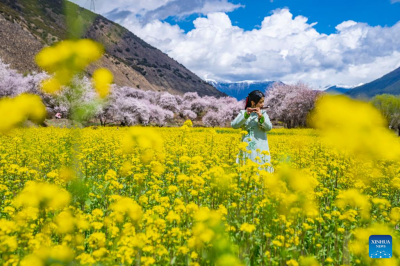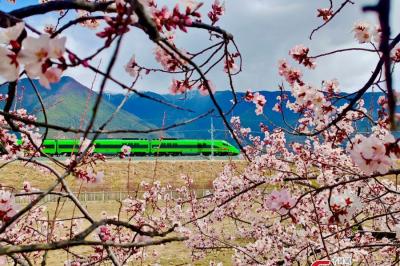| Aug.6, 2019 -- Raspberry is an ecological and economical shrub tree for soil and water conservation. Its fruit is sweet and contains sugar, malic acid, citric acid and vitamin C. It can be eaten directly and made into jam and wine. Its nutrition is easy to be absorbed by the human body, with the role of promoting digestion and improving metabolism.
Togde Town is located in the north of Lhasa City. Due to its high altitude and high soil sediment content, people here have been mainly planting traditional crops and the economic development of modern agricultural industry is slow. While in recent years, Lhasa's agricultural industry has developed rapidly, presenting a new development pattern of standardization, industrialization and specialization.
In 2015, Chengguan District organized workers of the agricultural and animal husbandry system to inspect the raspberry industry in Qinghai Province. Through evaluation and discussion, all the conditions of Togde Town were suitable for raspberry planting. In 2016, the raspberry industry was successfully settled in the town. Tibet Raspberry Agricultural Development Co., Ltd. and Lhasa Zhongyi Landscaping Co., Ltd. invested and built the raspberry ecological agricultural science and technology park.
"The company is mainly engaged in the raspberry industry and ecological industry. At present, through large-scale land transfer, the raspberry planting base has reached 80 hectares, with 1.2 million seedlings and a comprehensive survival rate of 95%," says Zhou Yubang, general manager of Tibet Raspberry Agricultural Development Co., Ltd., "next, we will continue to strengthen cooperation with Togde Town, integrate existing resources to create raspberry agricultural landscape and build a raspberry leisure science and technology agricultural park integrating tourism, entertainment and product research and development, so as to develop towards a diversified industrial chain and provide impetus for the sustainable development of Togde Town."
With the settlement of raspberry industry, the subsequent land transfer, industrial park rental dividend, agricultural planting technology training and other work, Togde Town gradually embarks on industrial poverty alleviation. With leading enterprises as the support, economic benefits as the link, and characteristic agriculture as the leading, the circulation mode of "company + base + farmer" is implemented to develop scale operation and cultivate industrial development path.
52-year-old Palbar is from Luoou Village of Togde Town. Three years ago, he has made a living by driving a four-wheeler vehicle. With the development of the raspberry industry, Palbar works in the picking garden, mainly doing some land reclamation work. After a long period of time, he has learned irrigation, weeding, fertilization, picking and other technologies, and become a manager of workers.
"It's hard to find good jobs in urban areas when one is older and without working skills. Unexpectedly, the development of the raspberry industry has driven villagers to find jobs nearby, and the income is not bad," Palbar says happily, "I get 120 yuan RMB a day for working in the picking garden. In 2018, the industry revenue has reached 42,000 yuan RMB."
Through its development in recent years, Tibet Raspberry Agricultural Development Co., Ltd. has effectively promoted local residents to find jobs in nearby areas by leasing poverty alleviation industrial parks and hiring long-term field labor. Technicians have also been sent to provide free training to local residents to improve their planting skills. At present, the number of local migrant workers reaches 400-500 every year, and about 200 people can obtain long term jobs.
Under the care and support of the party committee and government, the raspberry industry in Togde Town has been developing rapidly. In particular, raspberry picking festival indeed drives the boom of rural tourism. The raspberry industry has been vigorously promoted, which fastens the deep integration of modern agriculture and tourism, and makes continuous progress towards the direction of green and sustainable development.
At the same time, in order to deeply implement the concept of green development, as well as build a beautiful homeland of ecological security and green development, at the end of October 2016, a green pilot project has been carried out, with a planned land area of 68.9 hectares and green area of over 26 hectares. The construction period is 1 year and the management and maintenance period is 4 years. By the end of the project in March 2022, it will strive to achieve the goal of increasing the forest coverage rate by 0.32%, effectively improving the ecological and living environment quality around Lhasa, increasing the regional forest vegetation and biodiversity, slowing down soil and water erosion, and adding strength to the construction of forest city and ecological city.
By: Liu Fang, Zhi Xinghua
|
- Home
- News Tibet |Exclusive |China |World |Related News |Latest
- Documents White Papers |Others
- Photo Politics |Economy & Society |Culture & Religion |Human & Nature |Beautiful Tibet |Other Tibetan-Inhabited Area |Exchanges |Related
- Video News |Documentary |Micro-Video |Entertainment
- Art
- Tourism
- In Focus
- About Tibet






